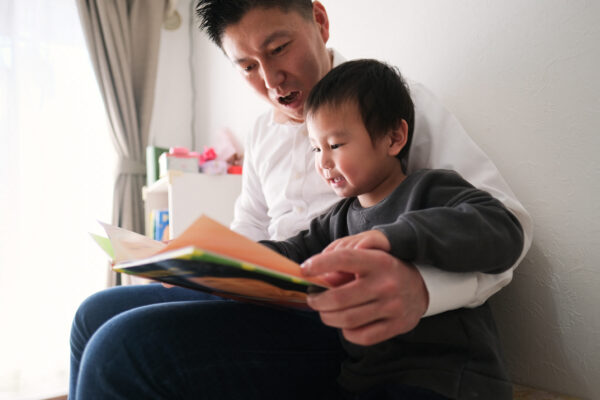 Helping your child feel loved is one of the most important initiatives of parenthood. And, when it comes to love, who better to call than Akron Children’s Dr. Love!
Helping your child feel loved is one of the most important initiatives of parenthood. And, when it comes to love, who better to call than Akron Children’s Dr. Love!
“The more kids feel loved from parents, the deeper the bond and stronger support for healthy child development — physically, emotionally and socially,” said Sarah Love, PsyD, a pediatric psychologist in Akron Children’s Lois and John Orr Family Behavioral Health Center. “In fact, love and affection are the foundation for success throughout their lives.”
There are things parents and caregivers can do on a daily, monthly and yearly basis that can make a big difference on how kids feel. Dr. Love shares 5 ways to make sure your children feel secure and valued this Valentine’s Day and every day.
5 ways to help your child feel loved
Carve out one-on-one time
One of the biggest ways to show love is spending time together. Dr. Love recommends parents or caregivers reserve time each week when they can be attentive, present in the moment and practice active listening.
This could mean setting aside special time each week to do an activity that’s meaningful to your child, such as playing a video game, shooting hoops in the driveway, window shopping or crafting together. It also could mean giving your undivided attention to your child a few minutes every day, such as letting your child lead the conversation on the drive home from practice or reading a book together at bedtime.
“It doesn’t have to mean setting aside big chunks of time that could be unrealistic to fulfill,” said Dr. Love. “It’s more important that your child has these regular windows of your dedicated time and attention on a consistent basis.”
Create family rituals and routines
Having family rituals and daily routines built in is another way to spend scheduled time together. Pizza night on Fridays, pancake breakfast on Sundays or movie night once a month are great ways to spend quality time together. It can also be a bedtime routine where you review the day together and plan for the next.
“It’s important to maintain routines especially when life gets chaotic,” said Dr. Love. “Being able to fall back on always having the same bedtime routine or eating family dinners together reduces anxiety in an anxious time.”
In addition, providing limits, boundaries, predictability and daily routines offer kids comfort and security because they know what to expect. These are the building blocks of security, she said. Knowing there are limits parents will put on their kids makes them feel safe and loved.

Spending one-on-one time together doesn’t have to mean setting aside big chunks of time. Instead, regular windows of your dedicated time and attention is what’s important.
Be tuned in to your child’s needs
Kids go through many developmental changes throughout childhood and your child’s needs will change with each stage. A toddler might need cuddles, while an adolescent might need more independence and choices. Being responsive to your child’s needs is important to help them feel loved.
In addition, each child may need to have love expressed in different ways. Following the 5 love languages, some kids may need words of affirmation, acts of service or gifts, while others might require quality time or physical touch. Learning what your child needs to feel loved strengthens your bond.
Offer labeled praise
The power of praise and positive attention is a great way to help foster a sense of love. Just be sure you are labeling and acknowledging your child’s behavior.
“Being specific about what your child did can go a long way,” said Dr. Love. “It’s important to be specific in what we’re praising and to label what your child did, instead of general praising, such as saying, ‘good job’ or ‘looks great’. The key in making a child feel loved is attaching the praise to your child’s effort.”
For example, if your child studied hard and it resulted in a good grade on the test, praise your child’s hard work and how it paid off. If your child helped you around the house, praise the effort and how it eased the burden for you.
Avoid quick judgements
Kids make mistakes. It’s OK, it’s all part of growing up. But, kids need to know they are still loved even when mistakes occur. So, the next time your child messes up, Dr. Love encourages parents and caregivers to avoid being reactive and making quick judgements.
“Instead, take a second to reflect on the situation, ask questions and listen to your child, and try not to jump to conclusions,” she said. “Help your child navigate the problem by asking them what they learned and what they would do differently next time. Have them figure out what they need to do to correct the problem.”
For example, if your teen stayed out past curfew, instead of yelling and grounding her the minute she walks in the door, start out by asking what circumstances led her to being late. Then, once you understand the situation, think about a logical consequence and how your child can resolve the issue.
Remember, money can’t buy love
It can be tempting to spend a lot of money on an extravagant activity or big gift to show your love and affection.
“But, we know your attention and the effort you put into the relationship are the best gifts of all,” said Dr. Love. “A child will eventually get bored with the toy or gift, but she will always remember how your time spent together made her feel loved.”
Learn more or schedule an appointment at Akron Children’s Lois and John Orr Family Behavioral Health Center.










